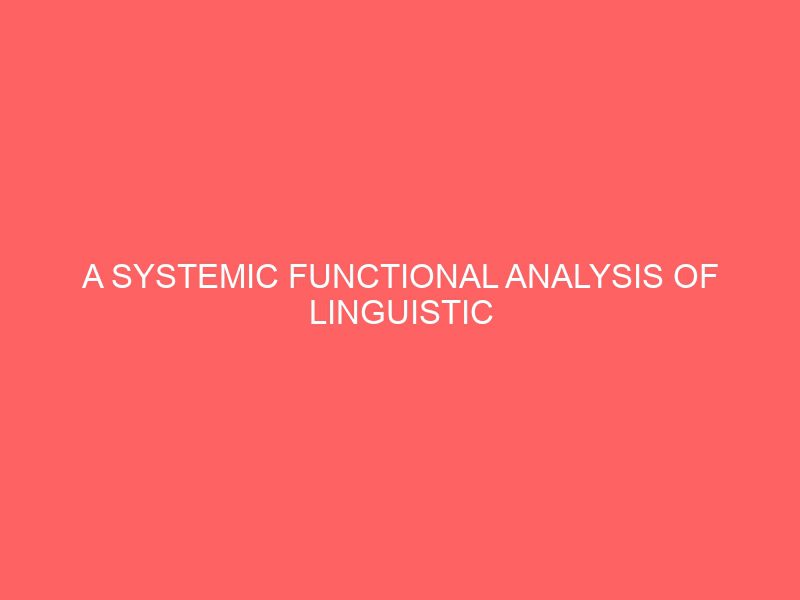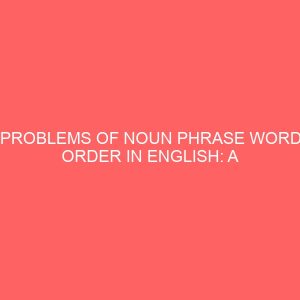Description
Abstract
The purpose of the study is to examine sexist linguistic constructions found in Nigerian ESL textbooks. Hallidays systemic functional linguistic model was used as a linguistic framework to carry out this research. Consequent upon the aim of the study, four ESL textbooks widely used across secondary schools in the country were carefully selected as the source of corpus of 200 clauses used for this study. The textbooks were selected by purposive sampling. The purposive sampling was done through mass observations of textbooks and mass observations of the sentences or clauses used in the textbooks to select the textbooks suitable for the study and to also ascertain the range of usage of the textbooks across secondary schools in Nigeria. The percentage/frequency counts method of data analysis was used to determine which gender specific terms dominated the communication structures of the clauses while the chisquare test analysis was used to test the hypotheses of the research. The research findings from the linguistic analysis revealed that more masculine terms were found in all positions in the thematic structures of the clauses. Based on participant role analysis, the study revealed that masculine terms dominated all participant roles except in the participant role of the senser which was considered the exclusive domain of women. Based on the test of independency, the result from the chisquare analysis sustained the null hypothesis Ho for the two hypotheses in the research. The findings from this study may be attributable to the way authors transpose existing sexist ideologies and cultures into their grammatical constructions. These sexist ideologies found in school textbooks could affect the way readers or learners view happenings in their environment and they may tend to internalize what they read into their psyches.
Table of Contents
Title page i
Approval page ii
Certification iii
Acknowledgements iv
Dedication v
Table of contents vi
Abstract ix
CHAPTER ONE: INTRODUCTION
1.1 Background to the Study 1
1.2 Statement of the Problem 10
1.3 Purpose of the Study 13
1.4 Scope of the Study 13
1.5 Significance of the Study 14
1.6 Research Questions 16
1.7 Research Hypotheses 17
CHAPTER TWO: REVIEW OF RELEVANT SCHOLARSHIP
2.1 Conceptual Framework 18
2.1.1. Systemic Functional Grammar 22
2.1.2. The concept Critical Discourse Analysis 26
2.1.3. The Concept of Text linguistics 28
2.1.4. The Relationship between Language and Society 29
2.1.5. The Relationship between Language and Culture 31
2.1.6. The Educational System and Gender Bias 33
2.1.7. women’s Role and Social Formation 35
2.1.8. Causes of Linguistic discriminations 36
2.1.9. The occurrence of Linguistic Sexism in School Textbooks 38
2.2 Theoretical Framework 39
2.3 Empirical Studies 44
2.4 Summary 48
CHAPTER THREE: METHODOLOGY
3.1 Research Design 50
3.2 Area of Study 51
3.3 Population of Study 51
3.4 Sample and Sampling Technique 52
3.5 Research Instrument 52
3.6 Method of Data Collection 53
3.7 Method of Data Analysis 54
CHAPTER FOUR: PRESENTATION AND ANALYSIS OF RESULTS
Presentation and Analysis of Results 55
CHAPTER FIVE:
SUMMARY, RECOMMENDATIONS AND SUGGESTIONS FOR FURTHER
STUDIES
5.1 Summary of Findings 68
5.2 Implications of the Study 70
5.3 Recommendations 73
5.4 Suggestions for Further Studies 74
Works Cited 76
Appendix 80








Reviews
There are no reviews yet.